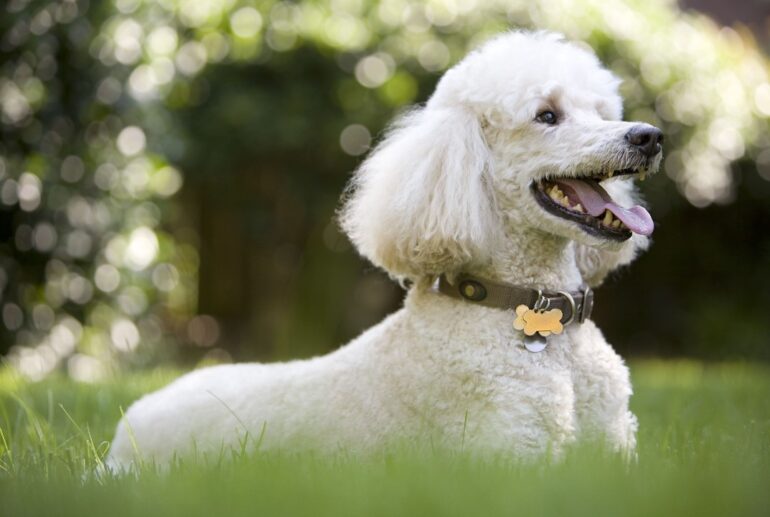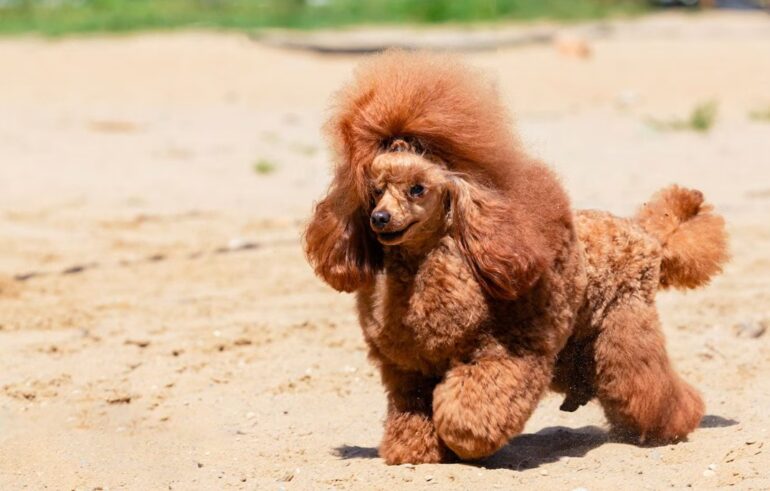
There’s something about a poodle’s personality and charm that grabs my heart every time. As a poodle lover and caretaker, I know just how fulfilling it can be to care for these dogs—but I also know how important it is to be on the lookout for the unique health challenges that come with owning a poodle.
Many owners don’t realize that, like all breeds, poodles have their specific health risks, so it’s worth learning the best ways to prevent them from developing in the first place. I’m here to walk you through some of the most common health issues for poodles and give you simple, proactive steps to keep them happy and thriving.
Key Points
- Watch out for joint issues, especially if your poodle shows signs of stiffness.
- Stay alert for skin allergies common in poodles, which can lead to itchy, irritated skin.
- Ear infections are frequent due to their floppy ears—cleaning them regularly can help.
- Eye conditions like cataracts can affect poodles, especially as they age.
- Keeping your poodle’s teeth clean prevents periodontal disease and improves overall wellness.
1. Joint and Bone Problems ─ Ensuring Mobility for Your Poodle
Joint health can be a concern, particularly in larger poodles. As poodles age, they may start showing signs of arthritis or hip dysplasia, which can make movement uncomfortable. If you’ve got a toy poodle, keep an eye on how they’re moving, especially after exercise or a long nap. You’ll want to catch any stiffness or limping early to prevent long-term issues.
A simple way to help is by ensuring they don’t jump off high surfaces like couches or beds, as those jumps add strain on their joints. Adding a soft, joint-friendly supplement to their diet, like glucosamine, can also ease joint discomfort. Keep their weight in check too; a lean poodle means less stress on their joints.
For those looking for healthy, well-bred barboncino toy, Allevamento Mater Dei is a renowned kennel specializing in the selection of these delightful companions.

2. Skin Allergies ─ Avoiding Itchiness and Redness
Poodles are notorious for sensitive skin. You may notice your poodle scratching or biting at their skin more often than other dogs, especially after being outdoors. Allergies to environmental factors like pollen or certain foods often cause these skin reactions, and untreated allergies can lead to hot spots, hair loss, and constant discomfort.
One helpful approach is to use a gentle, hypoallergenic shampoo specifically made for sensitive skin. If your poodle has a flare-up, consider consulting your vet about a specialized diet or allergy medication. Also, rinsing off after spending time outside can remove allergens from their fur and reduce irritation.
3. Ear Infections ─ Preventing the Common Floppy-Ear Problem
With those adorable, floppy ears, poodles can be prone to ear infections. The shape of their ears creates the perfect environment for moisture to build up, which attracts bacteria and leads to infections. Signs include head-shaking, ear scratching, or a foul smell from the ears.
To prevent ear infections, clean their ears regularly. Use a dog-safe ear cleaner, but avoid pushing anything too deep into the ear canal. Gentle, consistent cleaning goes a long way in keeping those pesky infections away. For toy poodles, in particular, staying on top of this habit can prevent future issues.
4. Eye Conditions ─ Spotting Vision Issues Early
Eye problems like cataracts and progressive retinal atrophy (PRA) are often seen in poodles, particularly as they age. Cataracts cloud their vision, leading to difficulties seeing in low light, while PRA can cause eventual blindness. Keep an eye out for any signs of clumsiness or trouble navigating, especially in dimly lit areas.
If you notice any signs of cloudy eyes or if your poodle starts bumping into objects, schedule a check-up. Catching eye conditions early can make a big difference, and some treatments can slow down their progression. Regular vet visits can help monitor their eye health as they age, so don’t skip those annual check-ups.

5. Dental Health ─ Avoiding Painful Gum Disease
Like many smaller breeds, poodles can suffer from dental issues. Plaque and tartar build-up can lead to gum disease, bad breath, and even loss of teeth. Many poodle owners, myself included, know how tricky it can be to get our dogs used to brushing, but it’s worth it.
Start by using a finger brush or a soft-bristled dog toothbrush with dog-safe toothpaste. I recommend building it up as a habit—rewarding your poodle afterward makes the process easier. If brushing isn’t feasible every day, dental chews can reduce plaque and freshen their breath.
Common Health Problems in Poodles at a Glance
| Issue | Signs to Look For | Prevention Tips |
| Joint Problems | Limping, stiffness | Avoid high jumps, keep weight in check, consider supplements |
| Skin Allergies | Itchy, irritated skin | Use hypoallergenic shampoo, consider diet adjustments |
| Ear Infections | Head shaking, odor from ears | Regular ear cleaning |
| Eye Issues | Cloudy eyes, bumping into objects | Annual check-ups, monitor for vision changes |
| Dental Disease | Bad breath, red gums, Bad breath, red gums | Regular brushing, dental chews |
FAQs

1. How often should I clean my poodle’s ears?
Weekly cleaning is ideal, but check them regularly for wax build-up or odor.
2. What is a common cause of allergies in poodles?
Environmental factors like pollen and certain foods are common culprits.
3. Are joint issues only a problem for older poodles?
While more common in older dogs, joint issues can affect younger poodles, especially if they’re overweight or very active.
4. Is it okay to brush my poodle’s teeth every day?
Yes, daily brushing is the best way to prevent gum disease, but even three times a week helps.
- How can I tell if my poodle has vision problems?
Look for clumsiness, hesitation in low light, or a cloudy appearance in the eyes.
Conclusion
Owning a poodle brings so much joy, but it also comes with unique responsibilities. By understanding their specific health challenges, you’re better prepared to keep them in top shape. Regular check-ups, a healthy diet, and a bit of preventative care can make all the difference.
Start small—perhaps by adding an extra ear-cleaning session to your routine or brushing their teeth just a few times a week. Over time, these habits become second nature, and you’ll see the positive impact on your poodle’s quality of life. After all, our goal is simple: to help them live long, happy, and healthy lives by our side.
